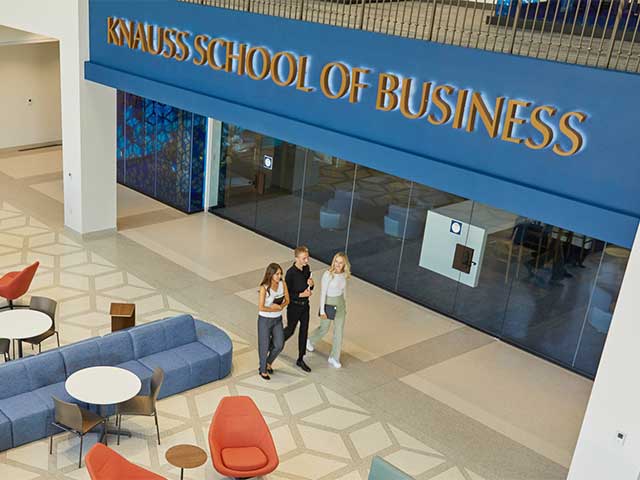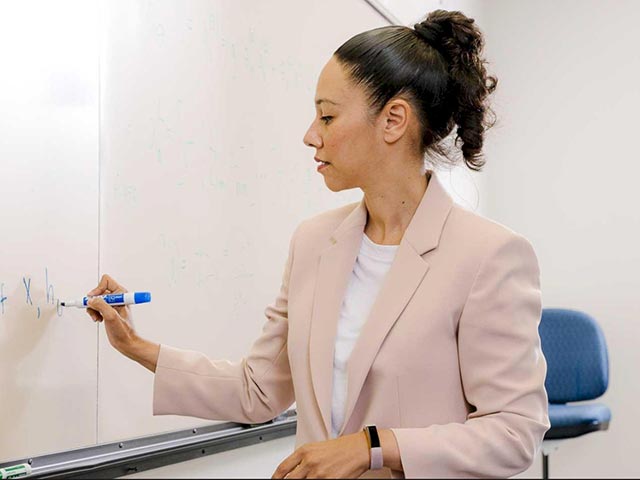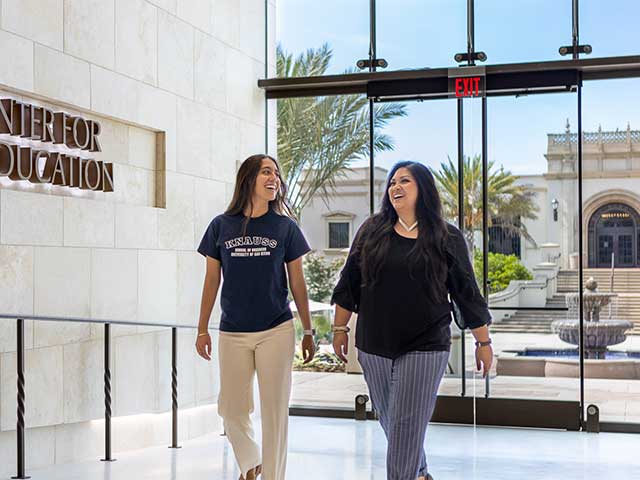The Value of a Master’s Degree in Finance: Is It Worth It?

"Is it worth it?"
It’s no secret that a master’s degree can lead to career advancement, salary increases and long-term success. In competitive and rapidly evolving fields like finance, a master’s degree demonstrates that you have a strong foundation of knowledge and the specialized skills you need to excel, making graduates highly sought by employers.
However, considering whether a master’s degree in finance is the right choice, it’s important to look beyond the financial and career return on investment (ROI). While a higher salary and better job prospects are certainly enticing factors, they’re not the only benefits of pursuing a master’s degree in finance.
To truly stand out in today’s dynamic job market, finance professionals must have advanced competencies and an in-depth understanding of industry trends.
Audio produced by Hubspot using AI narration.
Advancing Your Career with a Master’s Program in Finance
Not only can a master’s degree in finance equip you to advance in your career, but it also allows you to take a more meaningful stance on issues you care about. Investing in more experience through your education allows you to make positive social and environmental impacts since you’ll have a more robust understanding of the industry, its history, and your place in it.
By learning more about the industry, you’ll be better equipped to be a changemaker within the field. You can work to advance sustainable financial practices like:
Impact Investing
Instead of investing for your gain or the financial growth of your clients, impact investing allows you to make positive, measurable social and environmental impacts while still seeing significant financial returns. This market helps fund sustainability efforts like sustainable agriculture, renewable energy, affordable and accessible housing, and more.
Environmental, Social, and Governance (ESG) Integration
Rather than leaving the effects of your business choices as an afterthought, ESG integration allows financial professionals to consider the cost of their actions from the start and help to increase their long-term investment performance and sustainability. By approaching finance with the environmental, social, and governance implications top of mind, you can assist in harm reduction and exploitation at every level of finance.
Socially Responsible Investing
Investing in companies with positive social impacts helps you make the most of your money, both personally and through the causes you care most about. In this type of investing, you can put your action and resources behind what you care about socially and politically, enacting real change and improvements in your community.
Choosing a master’s program that prioritizes doing business for good gives you a seamless transition from your studies into your career. With a Master’s degree in finance that considers the social and environmental impact of business and the economy, you’ll be equipped to participate in the good work that socially responsible businesses already do in their local communities.
Access to Specialized Knowledge and Skill Development
A master’s degree in finance gives students an easy way to apply their learning to ethical and sustainable financial career practices. In a graduate program, students engage deeply with sustainable investment strategies and green finance. The Master of Science in Finance at the University of San Diego’s Knauss School of Business is comprehensive and progressive, helping graduates navigate the financial landscape through a lens of social responsibility.
Some of the courses central to the Master of Science in Finance program that highlight ethical financial practices are:
MFIN 505 - Ethics: This course provides insights into ethical considerations integral to financial decision-making.
MFIN 510 - International Finance: This course allows students to examine sustainable investment strategies on a global scale and explore how world economies work together to promote long-term, environmentally friendly economic growth.
The Knauss School of Business also offers dual degrees and MBA concentrations for finance students to hone their gifts and passions and do the most good with their finance degree.
This degree allows students to develop skills directly applicable to socially responsible investing. The in-depth knowledge acquired during study informs graduates' capacities to contribute meaningfully to initiatives aimed at realizing a sustainable and ethical financial future.
Implementing what they acquire from courses such as "Financial Econometrics" (MFIN 514) and "Advanced Fixed Income and Structured Finance" (MFIN 517), graduates of USD’s program can address complex financial issues with data-backed insights. Using detailed financial analysis and strategic financial management skills, they can identify sustainable investment opportunities more efficiently and help drive "business for good" initiatives.
Networking and Industry Connections
Networking is especially important in finance. It opens doors to connections with professionals and organizations deeply engaged in sustainable finance initiatives and “business for good” organizations.
Rather than trying to find these connections on your own, a graduate program gives you the advantage of trusted connections and long-term professional relationships your school has already established. These robust networks can redefine a graduate’s career trajectory, embedding them in spaces that uphold their values and commitment to positively impacting society.
For those committed to a more sustainable and equitable world, strategic networking is a crucial tool for seeking connections with organizations committed to “business for good.” As graduates immerse themselves in a community of like-minded professionals, they can take their learning beyond academics and glean practical insights into driving positive change and effectively measuring impact.
Networking also brings collaboration between like-minded organizations through shared projects, mentorships, brainstorming sessions, resource sharing, and more. These exchanges are fueled by a shared commitment to sustainability and impact that can help drive innovation in the sustainable finance industry.
Competitive Advantage in the Job Market
More than ever, companies and organizations acknowledge the need for financial decisions considering ethical and sustainability factors. There's an increasing awareness that financial performance and societal impact aren't mutually exclusive but can and should go hand in hand.
In the evolving landscape of today's job market, a Master's Degree in Finance offers a competitive advantage to graduates. With the growing awareness of the importance of sustainable finance comes a need for more professionals trained in advancing the field. Those who earn a Master of Finance focusing on socially responsible practices have an edge in their professional pursuits.
While a degree in Finance builds a strong foundation in business and finance, a specialized Master's in Finance goes deeper into specific finance topics and principles. This comprehensive knowledge base bridges the gap between finance and business in organizations and makes graduates more marketable. By mastering complex and nuanced financial concepts, they're better equipped to fulfill the pressing needs of modern organizations.
What Can You Do with a Master’s in Finance?
A Master's in Finance opens numerous doors in ethical and sustainable finance. Graduates can find work in impact investing firms, take up challenging roles in sustainable finance departments within banks, or focus on ESG (Environmental, Social, Governance) integration across various industries.
These roles offer unique opportunities to contribute to "business for good" strategies and to become changemakers in the financial industry.
Is a Master’s in Finance Worth It?
Yes. Choosing a master’s degree that integrates sustainability into financial analysis and decision-making processes is more crucial than ever. The Master of Science in Finance from USD’s Knauss School of Business provides graduates with the skills and knowledge necessary to contribute to the growing field.
Our program takes just ten months to complete, so it’s a viable option for professionals looking to jumpstart their careers in finance quickly. Despite its relatively fast pace, the master's program doesn't compromise on quality or depth, offering specialized coursework that goes deep into the core areas of finance, sustainability, and ethics.
Choose the University of San Diego’s Knauss School of Business for Your Master of Finance
In a rapidly evolving financial landscape, a Master's degree in Finance from the University of San Diego offers a vibrant mix of career advancement opportunities, specialized knowledge acquisition, extensive networking potential, and strong industry recognition.
Deeply rooted in sustainable finance principles, this degree cultivates an understanding of ethical practices and "business for good" initiatives. It stands at the intersection of financial profitability and social responsibility, shaping graduates who can manage both concerns effectively.
This knowledge equips graduates to participate in and contribute meaningfully to responsible and sustainable finance practices, which profoundly impact financial performance and social and environmental outcomes.
Understanding sustainable finance and the principles of "business for good" enables graduates to move beyond traditional financial roles and contribute significantly to a more equitable and sustainable world. A Master's in Finance represents an investment in personal career growth and a goal of reshaping the world through sustainable financial practices. It serves those who dare to envision a better, more equitable world and equips them with the knowledge, skills, and connections to turn that vision into reality.
To learn more about the Master of Science in Finance from USD, download our guide, or, explore finance career opportunities.
Or, you can request more information about our programs today.





